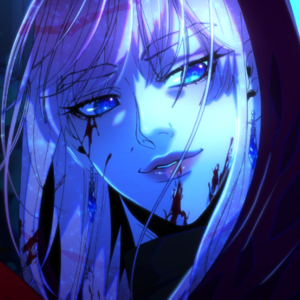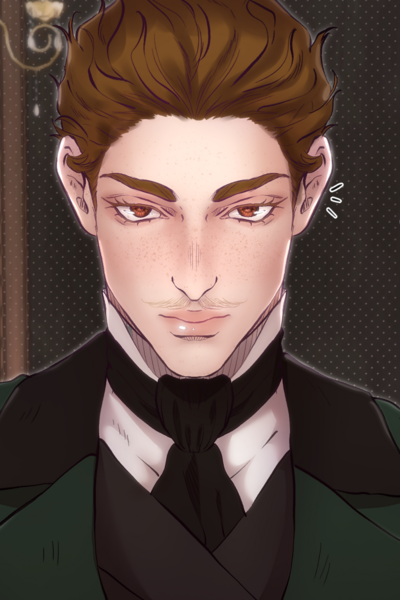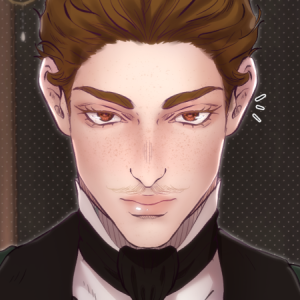Cécile sat in the quiet warmth of the nursery, her newborn cradled in one arm, Pierre’s twin infants nestled against her chest as they fed. The flickering glow of the oil lamp cast soft golden light over the wooden rocking chair where she sat, illuminating the peaceful rise and fall of the babies’ tiny chests. The gentle sound of suckling filled the space, soothing in its rhythmic consistency.
Ivonne stood near the crib, adjusting the linens with practiced care. Though the weight of grief still lingered in the manor, the nursery remained a place of serenity, a small refuge from the storm of sorrow that had engulfed the household.
Cécile sighed, shifting slightly as she adjusted the infants in her arms. “I have to say, I’m glad we have Monsieur Gabriel here,” she murmured, keeping her voice low. “He makes life easier for everyone, especially now. If it weren’t for him keeping Monsieur Pierre from drinking himself into an early grave—I don’t know what would’ve become of this household.”
Ivonne scoffed, smoothing out a small blanket. “Easier?” she repeated, arching a brow. “I suppose in some ways, yes. He knows how to manage things, and he certainly knows how to handle Monsieur better than the rest of us. But Gabriel… he’s not the easiest man to talk with.”
Cécile hummed thoughtfully, glancing down at the infants before looking back at Ivonne. “I did notice something peculiar about him,” she admitted. “His last name—d’Ernemont.” She hesitated, choosing her words carefully. “That’s a noble name, isn’t it?”
Ivonne’s hands paused for the briefest of moments before she continued her task. “It is,” she admitted. “Or was.”
Cécile frowned. “So, he’s from a fallen noble family, then?”
Ivonne nodded. “That’s what I heard.”
Cécile let out a quiet chuckle, shaking her head in disbelief. “Then what’s a man like him doing working as a valet for someone like Monsieur Pierre?” She lowered her voice slightly, glancing toward the nursery door as if someone might overhear. “No offense to Monsieur, but he’s no nobleman. He was born into wealth, yes, but his father—Alexandre Dupont—was a revolutionary, wasn’t he?”
Ivonne sighed, tucking the blanket under the edge of the crib. “That’s right,” she confirmed.
Cécile shook her head again, glancing down at the babies in her arms. “That makes it even stranger, doesn’t it? The son of a fallen noble family working for the son of a famous revolutionary?”
Ivonne leaned against the side of the crib, folding her arms. “From what I know, they met in the army,” she explained. “I wasn’t around back then, but I heard they fought together during the war and became good friends there.”
Cécile blinked. “Friends?”
Ivonne shrugged. “That’s what they say. And I also heard that Gabriel saved Monsieur Pierre’s life back then. That’s why, when the war ended, Monsieur offered him a position in the household. It was his way of repaying a debt.”
Cécile’s lips parted slightly in surprise. “So, Gabriel—despite being the son of nobility—had nowhere else to go?”
Ivonne nodded. “That’s what it seemed like. He had no family, no home, and Monsieur Pierre, isn’t an unkind man. You meet him at his worst, but my Monsieur Pierre is actually a truly kind and friendly man. He gave Gabriel a comfortable room, a respectable job, and a place to belong.”
Cécile was silent for a moment, her mind turning over the information. “And yet… Gabriel doesn’t seem like the type to be grateful for it.”
Ivonne’s eyes widened. “Shhh… you don’t want to get into trouble with either of them, which you could if someone hears you and tells them.”
Cécile shook her head, an uneasy feeling settling in her chest. “I can’t imagine what it must be like,” she murmured. “For a man like him to serve a man like Pierre.”
Ivonne simply sighed, adjusting the pillows on the nearby rocking chair.
Cécile sighed slowly, something about it didn’t sit right with her. Something about Gabriel d’Ernemont felt… unnatural, and she realized with her conversation with Ivonne that she wasn’t the only one who thought that.
***
Gabriel stood just outside the nursery; his tall frame pressed against the dimly lit hallway wall. His expression remained unreadable, but his fingers twitched against the fabric of his coat, his jaw tightening ever so slightly as he listened to Ivonne and Cécile’s conversation.
They spoke as if he wasn’t even real, as if he were some loyal companion, bound to Pierre by gratitude.
‘I’m not Pierre’s dog,’ Gabriel thought.
As if he had ever been Pierre’s friend.
The very idea made his stomach turn.
Gabriel never recalled a single moment in their time together—whether in the army or in this godforsaken manor—where he had treated Pierre as anything more than an inconvenience. Pierre had simply been friendly to everyone, a man too open, too trusting, always offering his hand even to those who had no intention of taking it. It wasn’t friendship. It was just Pierre’s foolish nature, his inability to recognize that not everyone saw the world as he did.
And saving his life?
Gabriel scoffed under his breath.
Did they think he had done it out of some noble sense of duty? Some camaraderie born from war?
If he had let Pierre die back then, his revenge would have died with him. That was the only reason he had acted. If anything, saving Pierre had been the first step toward his ruin.
He clenched his fists, the words of their conversation still grating against his mind.
‘Monsieur Pierre isn’t an unkind man. He gave Gabriel a comfortable room, a respectable job, and a place to belong.’
Gabriel felt something sharp twist in his chest—disgust.
The thought of anyone believing he owed Pierre anything made him sick.
That damn revolutionary’s son had taken him in, fed him, clothed him, and in return, people saw it as an act of kindness. But what they didn’t know—what they couldn’t know—was that Gabriel had never needed Pierre’s charity. Every moment in this house, every breath he took in its halls, was nothing more than another step toward vengeance.
And yet, to them, he was the devoted valet. The good friend.
The thought alone soured his mood beyond repair.
Gabriel exhaled slowly, his fingers flexing at his sides. The irritation settled deep into his bones, an ugly, crawling thing that refused to leave him as he stalked down the hallway. He didn’t bother looking back at the nursery door. The voices inside faded as he put distance between himself and them, but the bad taste they left in his mouth lingered.
By the time he reached the lower floors, the frustration had sunk its claws deep into his mind. Even the simplest tasks—the things he usually performed with effortless precision—felt grating. The day dragged on with agonizing slowness, each passing hour another reminder of the words that had settled under his skin like splinters.
Grateful? To Pierre?
The very idea was enough to make his blood boil.
And so, he worked. He cleaned, he managed the staff, he checked on Pierre and forced him to eat, he did everything expected of him—but for the first time in a long while, the control he so carefully kept felt brittle.
***
That night, Gabriel dreamed.
The same nightmare. The same memory. The one that had haunted him for as long as he could remember.
It always started the same way—darkness, thick and suffocating, pressing in from all sides. But then came the noise. Loud. Deafening. The frenzied roar of a crowd, their voices merging into one chaotic, thunderous chant.
“Vive la Révolution! Mort aux traîtres!”
Gabriel was small. No older than eight. His legs shook beneath him, his small hands clenched into fists, his mouth stretched wide as he screamed. A tooth was missing from his upper jaw, a tiny gap where his innocence had once been. His face twisted with terror, tears carving paths down his flushed cheeks as he reached out, desperately, toward the scaffold.
“Papa! Maman!”
The people around him—too many, too loud, too close—pressed in from every direction, their sweaty bodies jostling against his fragile frame. Their shouts of celebration filled the air, drowning out his cries. Torches flickered wildly in the night, their flames licking at the darkness, casting grotesque shadows on the wooden platform ahead.
And at the center of it all—
A man stood, grinning triumphantly.
He was missing several teeth, the gaps in his mouth filled with crude gold replacements. His features were rough, his face unshaven, his breath no doubt reeking of wine and blood. But despite the vulgarity, despite the sheer filth of him, his resemblance was unmistakable.
He looked like Pierre.
Not entirely. But enough. Enough for Gabriel’s small mind to latch onto it, enough for the resemblance to carve itself deep into his nightmares for years to come.
The man stood atop the scaffold, holding two heads aloft in his grimy hands. Freshly severed. Blood still dripped from their limp, lifeless forms, staining the wooden planks below.
His father’s head. His mother’s head.
Gabriel could see the way his father’s eyes, once so warm, now frozen in an expression of vacant horror. His mother’s delicate features, once so full of love, now twisted in agony. Their blood dripped onto the executioner’s boots, pooling at his feet as the crowd roared.
The world spun.
Gabriel’s small chest heaved, his breath ragged and uneven as his screams tore through the night. His fingers stretched out toward his parents, but no matter how much he reached, no matter how desperately he tried—
He couldn’t reach them.
A strong arm wrenched him back.
“You must see this, boy. You must remember it. You must never forget—never forgive these bastards.”
The old servant’s voice was rough, strained with urgency. He was a large man, his grip ironclad as he held Gabriel against his chest, forcing him to witness the horror before them. The child struggled, kicked, clawed—but it was useless. The servant was too strong, his grip unyielding.
Gabriel screamed louder, his small voice breaking, pleading— “Papa! Maman!”
The crowd surged, shifting like a wave, pulling them backward. The old man began pushing his way through, dragging Gabriel with him away from the scaffold and away from his parents.
The air was thick with the stench of sweat, smoke, and blood. The heat of the torches burned against Gabriel’s skin, and the weight of bodies pressing against him made it hard to breathe.
His voice grew hoarse, his screams cracking into sobs. But still, he reached. Still, he fought.
They were gone.
They were—
Gabriel’s eyes snapped open.
His body jerked upright, his breath ragged, chest rising and falling in rapid gasps. His skin burned with sweat, his hands clenched so tightly his nails had dug into his palms, leaving crescent-shaped indentations.
The darkness of his room pressed in around him, silent, undisturbed. The walls, the furniture, the faint glow of dying embers in the fireplace—all the familiar things that tethered him back to reality.
Slowly, his breathing steadied.
But the rage—the hate—the deep, twisting agony lodged in his chest remained.
Gabriel exhaled sharply, dragging a trembling hand down his face. He leaned back against the headboard, his jaw clenched, his eyes staring blankly at the ceiling.
That man’s face—so like Pierre’s—still burned behind his eyelids. The way he grinned, the way the blood dripped from his hands, the way the crowd cheered and congratulated him for his parents' deaths.
And Pierre, the son of Alexandre Dupont, the man who betrayed and later murdered his parents. Pierre was a man who had been born from the very filth that had taken everything from Gabriel.











Comments (0)
See all